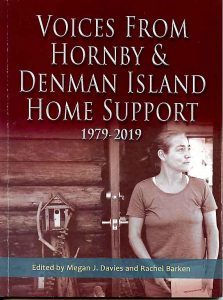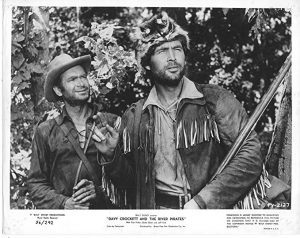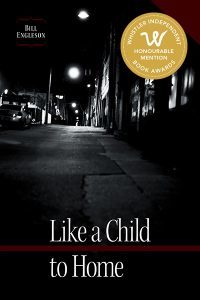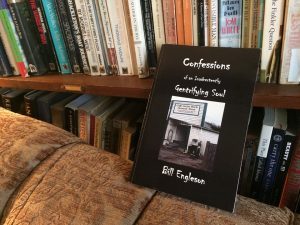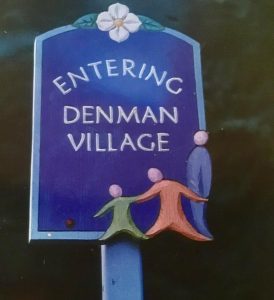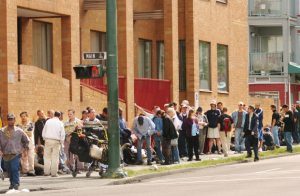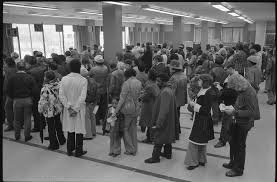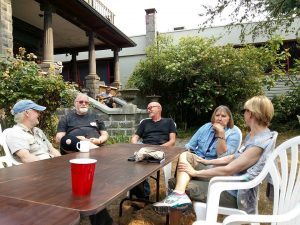Bill Engleson's Blog
February 2, 2023
Blog Post Title
What goes into a blog post? Helpful, industry-specific content that: 1) gives readers a useful takeaway, and 2) shows you’re an industry expert.
Use your company’s blog posts to opine on current industry topics, humanize your company, and show how your products and services can help people.
January 13, 2020
Hello world!
Welcome to WordPress. This is your first post. Edit or delete it, then start writing!
January 7, 2020
The Ormsby Review’s review of “Voices From Hornby & Denman IslandHome Support 1979-2019
This past autumn, the Hornby & Denman Community Health Care Society whose Board of Directors I have the privilege of chairing, published a seventy-six-page book, Voices From Hornby & Denman Island Home Support 1979-2019, to honour forty years of Home Support delivery on our two Islands.
Edited/Composed with skill, passion, and pleasure by historian Dr. Megan J. Davies and sociologist Dr. Rachel Barken, who also stickhandled the documentation of hours of interviews resulting in a video short retrospective filmed by Dale Devost, the book presents a beautiful almanac of memories by a host of contributors who shared their stories of the beginnings and growth of the anchor service of our organization.
Subsequently, we submitted the book to the Ormsby Review for consideration. As noted on their recently revised site, “Ormsby’s mandate is to review every major B.C. book from any source. Our critical and authoritative reviews and essays, written by experts in their fields, are packaged as illustrated magazine articles.”
While we awaited the review, we began to plan for a formal launch of the book. Though it is now available at Denman Island’s , we will hold that launch at Abraxas on March 14th 2020.
I am quite thrilled to share the review in Ormsby Review, edited and published by Richard Mackie, as prepared by reviewer Lee Reid of Nelson.
However, before I do, I would like to note that the book, in its final chapter, offers an intimate set of images captured by Denman photographer Mike Van Santvoord of the care in one home and portrays in the words of the two editors of the book, “the human element of the job, and the rich reciprocal relationships between workers and clients.” A couple of those cherished photographs appear in the review.
Sadly, days ago, the client in the photo essay, Rosemary Talbot, passed away.
I offer my heartfelt condolences to her husband, Gerry Talbot, and his family and friends.
Here is Lee’s Review of “Voices”.
https://ormsbyreview.com/2020/01/06/715-reid-davies-barken-home-support-denman-hornby/
[contact-form]
November 13, 2019
The Old Guy Who Talked to the Squirrels…or, at least, one Squirrel
I recently posted a link on Facebook that referenced squirrels and how, in the long ago, people kept them as house pets. Stimulated by that antiquated human behaviour oddity, I recalled that a couple of years ago I wrote a flash fiction piece that involved a squirrel. Here is that story which I titled…
The Old Guy Who Talked to the Squirrels…or, at least, one Squirrel
“Yup, that’s the way I remember it, Officer. Every day, I walk by that little park, sit down on the wooden bench by the stream, feed the squirrels, talk to ’em, tell ‘em it’s alright, squirrels are people too.”
Whack jobs thought Tom Dilly. On this beat, I get whack jobs. Still, Dilly, you gotta be professional.
“So, Sir, you were talking to some squirrels? What did they say?”
The old man looked at Officer Dilly as if to ask, “What would you expect a squirrel to say?”
“My apologies. It was one squirrel. I talk to them all but really it was only one of them who spoke to me.”
“One?” said Dilly.
“Yup. Their spokessquirrel, I guess you could say.”
“Fine. And he…it was a he?”
“Roberto. So, yes.”
“The squirrel who spoke to you is named Roberto.”
“Yup. Could be an alias, I suppose?”
“Right. What did Roberto say?”
“Well, he asked me if I had ever watched Davy Crockett’s Keel Boat Race?”
“I’m sorry. What?”
“It was a delightful Walt Disney episode back in the 1950’s. Before your time, I suppose.”
Dilly rubbed his eyes and momentarily wished for the weekend to arrive.
“So he asked you about some old movie?”
“TV show. Yes.”
“And did you remember it?”
“Vividly. Quite vividly.”
“And then?”
“He asked if I remembered the squirrel in the episode.”
“Another squirrel?”
“Yup. And I did. The squirrel kept throwing nuts in Georgie Russell’s coffee.”
“Georgie…?”
“Davy Crockett’s friend…played by Buddy Ebsen. Fine actor. And a funny scene. Highlight of my life up to then.”
“And he asked you about this…why?”
“Oh, to establish his credentials, I suppose. The squirrel in the film was an ancestor of Roberto’s.”
“So then he mentioned the Martians to you?”
“Just one Martian, officer. Just one.”
[contact-form]
October 13, 2019
You Never Know When You’ll Get Smacked in The Kisser with a Fresh Tomato, OR THE MUSE…
It was a quiet Sunday. Normally I’d be watching Trump Talks to His Body Snatchers in the morning and preparing to play Pickleball for a couple of hours in the afternoon.
But it was our Canadian Thanksgiving weekend. Family were driving down from Black Creek to break bread…seriously, vegetarian stuffing to go with the salmon and sprouts and all things good.
I had to stay home. Everyday I write a poem using the Merriam Webster word of the day. So, I wrote a poem using triskaidekaphobia.
I know, eh! Great word.
Anyways, I also read a story in Mystery Weekly, the Two-Body Problem by a pretty good flash fictionista, Josh Pachter. It happens that way sometimes. You read something you wish you’d written, and you suddenly want to craft your own masterpiece. I haven’t been writing flash for Indies Unlimited in some time but decided to take a boo at this week’s post. They offer an image and you respond with up to 250 words. The K. S. Brooks copyrighted picture this week was of a critter, a sea lion actually, staring up from body of water.
I immediately wrote a quite dark 250-word crime thriller.
And that, dear friends, spurred me on to get back to my WIP, Drawn Towards the Sun. Chapter 26, to be precise. As mentioned previously, the book is a prequel to my first novel, Like a Child to Home.
I jumped into the chapter, knowing what it was about and where it would (or at least, might) lead, information that had been sorely missing.
As a bonus, all this creative juicing has given me a mid-October blog post.
Hallelujah!
[contact-form]
September 3, 2019
Communal Memories…
I came of age in the 1960’s. When I was twenty, I moved into an urban commune, the Campus Residence Cooperative Association. Two Edwardian houses, next door to each other in the heart of New Westminster. For the first couple of summers, I went home to Nanaimo to work and earn the funds necessary to cover university costs. Half of 1969 was spent in Pine Point in the Northwest Territories working with Frontier College. The second half of that year was spent vagabonding in Toronto and Montreal. 1970, a pivotal political year in Canada, saw my return to the West Coast. I was somewhat aimless that year, dabbling in student life, staying with a friend, assisting her as she provided room and board to a few out of town first nations youth.
The October Crisis had a strong impact on me, hardened me to the point where my up-to-then transitory suspicion about the beneficence of government firmed up. Even though, years later, I would find a career in Government, albeit at the service delivery end, I never quite lost that mistrust of the magnanimity of the State as exemplified by Pierre Trudeau’s sweeping use of the War Measures Act.
However, around that time, I sought out the CRCA again and moved back in, staying for the next thirteen years.
I offer this abridged sketch of my early housing history to introduce the CRCA Library and this recent photo that appeared on the CRCA Facebook page.
I occasionally have been chastised for excessive promotion of my modest writings. There may be some truth in that. In this case though, I am offering my heartfelt gratitude for the continued existence of the CRCA, its beautiful library, stain glass and all, and a community I still feel a part of even though I moved away thirty-six years ago.
[contact-form]
August 15, 2019
Denman Island, DIRA, and the VIRL : A Personal History in response to a recent Facebook Discussion
For reasons I know not, decades ago, a decision was made not to institute a branch of the Vancouver Island Regional Library on Denman Island.
I suspect that people were happy with the local volunteer library, the Dora Drinkwater.
Jump forward a decade or two. Shortly after I moved to Denman in 2004, senior staff of the VIRL attended a DIRA meeting. They basically discussed their strategic plan of the day which was to create a Denman Island branch of VIRL. Just before, or likely just after, a rather simple survey of Denman Islanders heavily favoured the plan to have a public library.
Not too long after that, late 2004, or perhaps early 2005, DIRA created a Liaison position. The DIRA-VIRL Liaison. I volunteered.
The terms of reference were:
DIRA Liaison to VIRL Mission Statement and Terms of Reference (Revised along the way)
Mission Statement
To assist the community of Denman Island to acquire a branch of VIRL at the earliest possible moment
Terms of Reference
As Denman is scheduled to acquire a VIRL branch at some point in the future, the role of the DIRA Liaison is to assist ongoing communications between the Denman Community, DIRA and VIRL.
The DIRA Liaison to the Vancouver Island Regional Library (VIRL) will facilitate regular reciprocal communication between VIRL and DIRA by meetings and e-mail.
The DIRA Liaison will maintain regular information updates with the Dora Drinkwater Community Librarians.
The DIRA Liaison will recommend strategies to DIRA to keep the entire community and DIRA current on any developing initiatives related to the implementation of a VIRL Branch Library on Denman Island.
The DIRA liaison will recommend, when VIRL has taken meaningful and tangible action to move forward with the creation of a Denman Branch, that a representative committee of DIRA (and the wider community) be struck to support and facilitate community consultation and other processes required towards the realization of a public library on Denman Island.
Although I reported back annually to the DIRA AGM after that, nothing much ever happened.
This extract from my 2008/09 report summarizes those first few years:
“The role of VIRL/DIRA Liaison has existed for at least the past four years. Up until the end of the 07/08 DIRA year, it amounted to nothing much more than a few communications with the then VIRL Director of Support Services, Martin Gavin, enquiring about the status of the proposed Denman Library. We had been advised some years ago that 2008 would see some action. Essentially the plan was that VIRL would advertise for expressions of interest to house a VIRL Branch on Denman.
With the decision in late 2008 by the VIRL Board of Directors to hire a consultancy firm to review all of its facility standards, future building projects were effectively put on hold.
It is 2009 and very little has happened. Recent communications with Rosemary Bonnano, the Executive Director of VIRL, indicates that the Library Board will, at their late March meeting, receive the draft Request for Proposal information which, if passed, will permit them to advertise on BC Bid for a consultant to do the review.
This likely means it will be some months before the review is completed.”
The 2010 VIRL Facilities Report basically severed any hope Denman would garner a branch of the Public Library system within the foreseeable future. Where once we had been included in the discarded earlier Strategic Plan of VIRL, we were now not mentioned.
In the February 2011 Flagstone, I submitted the following article:
Libraries, Damn Libraries and Library Statistics- a long overdue report on
“Going VIRL ”
Bill Engleson- DIRA liaison to the Vancouver Island Regional Library
“From the moment I picked your book up until I put it down, I was convulsed with laughter. Someday I intend reading it.” Groucho Marx
Some days, the notion that Denman Island might one day have its own little VIRL branch almost convulses me and others, those few with a regular inside track to my ramblings about the inertia of VIRL liaison engagement, with raucous laughter. For the past four or five years, almost as long as I have been on Denman, I have served as the Liaison between DIRA and the VIRL. Additionally, as one of the Dora Drinkwater Library Volunteers, I have supposed that I am reasonably well placed to foster the goal of finagling a branch of VIRL on Denman. We are, on Denman, rich with the tradition of the Dora Drinkwater Community Library. In the absence of any public library coming to Denman, we are sustained by her. Still, she is under-utilized. Though she serves as a repository for many of Denman’s more valuable and occasionally requisitioned documents, and sees on average, 6-8 patrons during the 2 hours each of the six days a week it is opened, she does not profit from many of the wider services a public branch would bring.
“The best of my education has come from the public library… my tuition fee is a bus fare and once in a while, five cents a day for an overdue book. You don’t need to know very much to start with, if you know the way to the public library.” Lesley Conger
The fiscal reality of library politics here and everywhere is dark and ominous. Recently, in Toronto, the new Mayor has speculated about closing at least one neighbourhood branch of the Library. British Columbia is also facing increasing constriction of Library services as public funds become more precious…though they have always been preciously, some say precociously, dispensed. In 2009, I sent the following missive to the Times Colonist. I believe it captured a certain existing political reality then, one which has not much abated as we tiptoe into 2011.
“I cannot remember a time when I couldn’t read. I went through the BC School system so something must have been working right way back in those magical days of the 1950’s. As I think about the incredible pleasures, both practical and esoteric, that flow from the simple ability to read, I wonder about current conflicting policy initiatives that, on the one hand, supports occasional well-publicized efforts to spread literacy and, on the other hand, systemically slash existing library budgets to assuage failed, Olympic-sized, political ambitions .
On my small island of 1200 people, we have a longstanding, yet incredibly basic, volunteer library. Many of us hope that VIRL will one day soon be able to actually provide not just a part-time local library branch but all of the onsite benefits that would accrue.
How the backwards attack on Libraries by the beleaguered Liberals will affect our wish to share in the benefits of a branch of the Library system is clearly an unknown at the moment. Good people are trying to rectify this longstanding oversight.
In most communities, Libraries are a valued community asset and reading a vital human activity. Our political system may need people of greater vision than those presently charged with the task of government.”
“If you have a garden and a library, you have everything you need.” Cicero
Where are we today?
In June of 2010, a contracted Facilities Report was presented to the VIRL Board. This report itemized a number of significant and potentially costly repairs and improvements which buildings leased and owned by VIRL require. The report neglected to make any reference to the notion of a public Library on Denman.
Our Regional District Rep, Bruce Jolliffe, who represents the CVRD on the cumbersomely large VIRL Board of Directors, recently added the issue of a library branch on Denman to the CVRD agenda. Though appreciated, this is an introductory gesture and will need to be built upon. The next step, it seems to me, is for the VIRL Board of Directors to have substantive discussion on the matter, culminating is some definitive (and meaningful) action.
VIRL recently extracted a statistical summary of items borrowed from VIRL by people registered as Denman Island residents over the period January 2009-October (approximately) 2010.
Even with the few small quibbles I may have about the overall validity of the data, the information, at the least, seems to support the premise, hardly earth shattering, that residents of Denman are strong and active users of VIRL. Over a two-year period, between Jan 2009 and an unclear date late in 2010, VIRL stats suggest that over 243,000 library items were borrowed by 444 Denman residents. While this seems a somewhat overstated number, the salient point is that a substantial number of Islanders are registered and active VIRL users. It is important to note that over 100 Denman residents also utilize Books by Mail. If you are not familiar with this service, Denman Islanders are eligible to access it because we are classified as rural…a designation only because we do not have a VIRL branch. To get registered, email: bbm@virl.bc.ca or phone 1-877-415-VIRL (8475)
“Perhaps no place in any community is so totally democratic as the town library. The only entrance requirement is interest.” Lady Bird Johnson
At the moment, acquiring a public library branch on Denman is not much more than an intellectual exercise. If and when it seems that it might become a certainty, the likely course will be to form a group of the committed to assist in the transformation. Until then, I strongly recommend residents make use of Books by Mail. Additionally, any commentary in Island publications or local newspapers might assist the plodding process of gaining a sustainable branch of VIRL on Denman. Thank you.
30
Sometime later, in 2012, there was brief spurt of additional political folderol:
“Support for Denman Island library idea”
Comox Valley Echo Published: Friday, March 02, 2012
Denman Island should have its own library branch, says Comox Valley Regional District.
At their board meeting on Tuesday, directors called on the Vancouver Island Regional Library Board to include money for such a branch in its forward capital plan.
Rural Area A director Bruce Jolliffe said the argument for a library had been raised before, without success. But he felt it was time to try to get things moving again, as he was confident the Denman Island community supported the idea.
Comox Coun. Barbara Price said the issue had been discussed some years ago, but the library board had not taken up the idea as one of its priorities. “But I consider it is overdue,” she commented.
Hornby Island already has a branch library run by the VIRLB, as does Union Bay. There are three other branches in the Comox Valley – at Courtenay, Comox and Cumberland.”
To recognize the gesture of the CVRD, I submitted the following letter to the Echo which they graciously published.
“Dear Editor,
As a Denman Island resident who strongly believes a Public Library is an essential ingredient in the life of a healthy community, I have nothing but kudos for the CVRD Board, and especially Area A Rep Bruce Jolliffe, for pursuing and promoting the possibility of a branch of VIRL on Denman.
Libraries can be, should be, and often are, the heart and soul of community. While Denman Village, or Downtown Denman as some occasionally call it, has a long standing volunteer library, the Dora Drinkwater Community Library, which I have the pleasure of staffing once every two weeks, does operate on the respected remains of a long worn shoestring and deserves to be transported into the range of services and sweep of the 21st Century Regional Library system.
There are many of us on Denman who are willing to assist the process and now we ask the VIRL Board to embrace the overture of the CVRD and get the job done.
Yours,
Bill Engleson
Denman Island Public Library Activist (if there is such a creature)”
EPILOGUE
One of the benefits of not having a physical plant is that Denman is deemed to be “rural”, a designation that allows residents to receive Books by Mail. While a marvellous service, and reasonably well utilized, it is not an actual physical library with the wealth of services a physical location provided.
After 2012, there were a few more meetings. A couple of years rolled by. Finally, and I have misfiled my resignation letter, but I believe it was in 2015 or thereabouts, I resigned as the DIRA-VIRL Liaison. No one else expressed interest in the position although it was not advertised.
Though I consider the process and my participation an abject failure, it was interesting. I’ll give it that.
[contact-form]
July 15, 2019
What Will It Take?
I suppose everyone has their hobby horse. Social media certainly allows ease of access for the expression of their respective pet ponies these days.
For me, my preferred equine is the state of child welfare in British Columbia. That of course reverberates beyond my home province. And of late, the incarceration of children in Mr. Trumps prison camps has only expanded the discussion.
But, back to BC, a province I hope with all the optimism I can muster will one day provide the proper amount of resources to address the needs of its abused and neglected children. This includes the provision of sufficient means for families whose principal predicament is a lack of monies to provide suitable food and housing for their kids.
Here is a Facebook post I made today. I may not bring any new thoughts to the barren table of progress on child protection, but I am content to repeat myself here on my very modest blog.
One of the telling parts of this painful story (In the May 1st, 2019 Campbell River Mirror) is the lack of comment in the paper. I accept that I am almost seventeen years behind the times, out of date. I am a dinosaur. My protection career ended in 2002. Even with that, this story is as old as the child welfare hills. It speaks about massive bureaucratic expectations and failure, the ongoing failure of successive governments to provide enough workers to do this most demanding of jobs. Here is an extract from my novel about child protection, Like a Child to Home. I’ve quoted this passage before. I apologize for my boring repetition. I think, however, that it captures some of the weight and the demands of the job of being a child welfare social worker.
“But, sadly, I was tumbling into a bottomless lake, up to my floppy ears in administrative alligators…I sat in my office Monday morning…I was consumed by the overwhelming toll last week had taken on me. My legs and arms dragged me down in my chair, and I felt immobilized. If I’d had any sense, I would have taken the week off and flown to Cuba or some similarly warm and distant place.
The thing was that last week was no different from any of our work weeks. Each and every day is like an expedition to the escarpment. Along the way it gets hairier and hairier; supplies, resources, and personnel fall away. Giant apes throw rocks at you. Friends and fellow workers plummet into the deep canyon. Some scream; others simply plunge in resigned silence. You scramble up the cliff, clinging precariously to the stone by your bloodied fingertips, hoping the emotional pitons don’t pull loose. The demands of each day remain, heavy, as constant as a hard, thick, endlessly squalling West Coast rain. That’s the way of a rain forest; a damp union of souls and squalls.”
[contact-form]
April 25, 2019
I Have Never Been Poor…
This brief post is about poverty. In a way I feel that, in trying to make a few observations, I am appropriating an aspect of poverty’s culture that I have no right to comment on. Although, and I have never really thought all that much about my first couple of years in terms of poverty, In early ’46, my parents bought a little fish boat and set to sea. Neither had any ocean fishing experience. At the appointed time, I joined the crew. My first year was spent primarily in a basinet atop the motor. We may well have been not all that flush. Luckily, both of my parents were sharp with money, fiscally prudent, thrifty. Somehow, they managed to buy a partially completed house in the south end of Nanaimo.
We were on our way up a few rungs on the ladder.
That aside, I have been thinking quite a bit about poverty for the past few weeks as I read a powerful memoir, Hand to Mouth: Living in Bootstrap America, by a painfully honest writer, Linda Tirado
I was thinking about Tirado’s book as I read Paul Willcock’s recent Tyee article, Why Do We Cruelly Lock Poor People Out in the Rain?, about a welfare office in Abbotsford and the decision to have applicants etc. stand in a line outside.
In the chapter, We Do Not Have Babies For Welfare Money, Tirado goes on a tear:
“I have the solution to hungry children in America. Nobody wants to do it, but here goes: Fucking feed people. Cancel the programs where we pay farmers not to farm, and grow food. Buy it from them and use it in schools. Create real jobs…Stop calling it welfare and start calling it something else that describes what it is: a subsidy like any other so that the people actually moving this huge wheel of capitalism can live decent, maybe basic but still pleasant lives. Hunger: solved.”
Hers is an American rant of course but it gets to the nub of poverty in so many places. One of the principal ones, anyways: hunger.
Back to Willcocks and the Abbotsford Welfare office. When I started working in Child Welfare, back in 1978, Income Assistance (Welfare) and Child Welfare, both provincial functions, were under one roof. The offices had heft. Certainly, where I worked, in the bowels of Burnaby BC, there was a sizable congregation of workers. Shortly after I started, we were divided into three branch offices. Even with that, we had a dozen workers and support staff manning (personing?) the building.
There were, over the years, a few tense moments with angry clients demonstrating their unhappiness with the service they were receiving but, all in all, I never felt unsafe.
The arguments being offered in Abbotsford, and as I understand, in other jurisdictions, for forcing folks to huddle outside in all kinds of weather to wait for service are, as articulated by Pastor Jesse Wegenast, harm reduction coordinator with the 5 and 2 Ministries, and quoted in the Abbotsford News,
“first, to encourage people to access services online, and second, based on a decision from the occupational health and safety committee at the branch who wanted to limit the number of people in the waiting room at any given time.”
How specious is the first one is anybody’s guess. Compelling people to stand in line so that they will go on-line is downright Orwellian. It is also, likely, not all that effective, especially if some of the folks obliged to line up don’t have easily available internet access.
My few months as a Financial Assistance Worker in a welfare office in late 1983 demonstrated to me how personal were the needs of many people seeking financial support. On the other hand, as an option, online can be efficient…when it works.
The second rational, a decision of the Occupational Health and Safety Committee, on the surface, seems to have some merit. It is hard to argue against providing a safe workplace. The world can be an unsafe place. Schools have suffered horrendous attacks. Churches. Temples. Movie Houses.
Income Assistance offices in British Columbia have changed considerably in the past twenty years. In my final work years, a few under the NDP government of the day, these officers were taking on a harsher hue. Staff security and the resulting isolation/criminalization of clients was taking hold. This was partially occurring under the NDP’s, Moe Sihota, who, for a time, had the misfortune to be the Minister of the somewhat inaccurately monikered, Ministry of Social Development and Economic Security.
Willcock’s article looks at attitudes about poor and a range of related issues. He also notes that the CBC recently mentioned that ministry staff deal with clients from behind cubicles that have “walls of glass and steel doors.”
The message is clear. The poor are dangerous.
Many services are protected by barriers these days. Just visit a police station. But I am getting off track. The issue is having people standing in lines outside regardless of the weather.
That needs to stop.
or
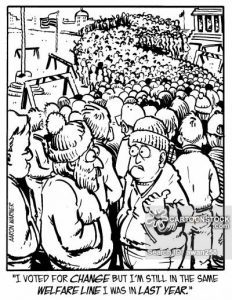
‘I voted for change but I’m still in the same welfare line I was in last year.’
or
[contact-form]
March 15, 2019
A Few 2019 Birthday Thoughts…Nothing Too Wise, Though…I Mean, You Have To Consider The Source.
Today, I turn seventy-two. That is a fair number of years to have lived. On the one hand, its not that impressive. There’s no great achievement here. Still, I suppose I am feeling a bit cocky. Perhaps I am deserving a small pat on the shoulder and a hearty, “well done.” Seventy-Two. In 1965, it was considered the average life expectancy for a Canadian male.
This probably isn’t as comforting as I wanted it to be.
Nevertheless, I feel a tad well done. Aging can be a bit of work.
And I’m retired.
Work is somewhat of a non sequitur.
This particular day, another horror has been visited on the world. The terrible Christchurch Mosque killings are evil personified. Still, each and every day of the year, year in and year out, terror finds a way to express itself. While terror has its persistent way, so many other positive actions are taken.
Children around the world today are on strike for their future.
I wish them well.
They deserve their future.
We should do our utmost to assist them.
As you can see, nothing much wise is coming from me.
Seventy-two.
Hmmm!
Pretty impressive for an unambitious writer guy.
Here is a semi-flattering snap from a fun memory, the CRCA Reunion of August 2017. Ignore the blatant use of plastic.
[contact-form]

